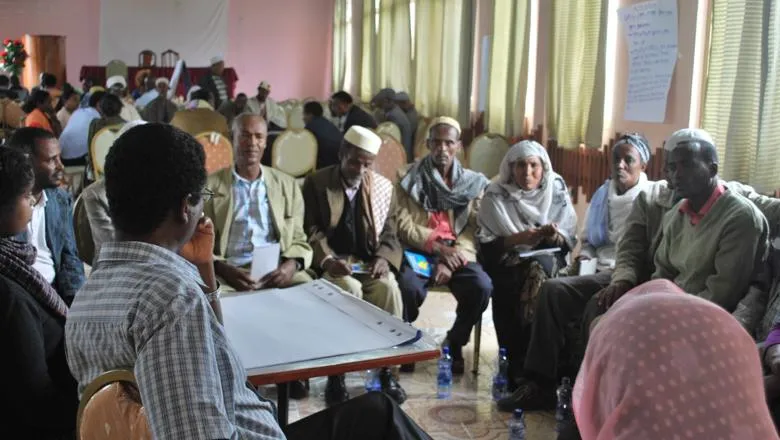Our study demonstrates that, with the right support, non-specialist primary healthcare workers can make a huge difference in under-served settings by providing care that is essentially as good as current models that are based on scarce specialist workers. This means that more people can get the help they need much more easily.”
Dr Charlotte Hanlon, King’s IoPPN and Addis Ababa University
16 December 2021
Non-specialist healthcare workers provide effective and safe care for people with severe mental health conditions in rural Ethiopia
New research from the Institute of Psychiatry, Psychology & Neuroscience (IoPPN) at King’s College London and Addis Ababa University, indicates that integration of mental health care into primary care can be an effective and safe means of delivering continuing care for people living with severe mental health conditions like schizophrenia.

The research, published today in The Lancet Psychiatry, found that training non-clinician primary healthcare workers to deliver care according to the World Health Organization’s mental health Gap Action Programme (mhGAP) guidelines was no less effective or cost effective than existing out-patient care provided by psychiatric nurses.
This study represents the first randomised controlled trial exploring a model of integrated care for people with severe mental health conditions in a low- or middle-income country primary care setting.
This study builds on pioneering work by Ethiopian colleagues who conducted a large-scale, community-based trial of people with severe mental health conditions. Their work had demonstrated that poor access to quality continuous care has numerous adverse impacts on people with severe mental health conditions, including impoverishment, homelessness, human rights violations and premature mortality.
The models of care currently available are based on the use of specialist mental health workers who are restricted to centralised and urban areas, whereas the majority of the population live in rural settings.
The new model of integrated care tested in this study has potential to substantially expand access to care and mitigate these adverse impacts.
The study recruited 324 individuals living with severe mental health conditions in the Butajira area of Ethiopia, and randomly divided them into two groups – those receiving care from primary healthcare workers, and a second group that would receive outpatient care from a psychiatric nurse.
Participants were assessed for several clinical, social and safety outcomes, including how well they could function on a day to day basis, experience of discrimination, and the cost effectiveness of their treatment.
At the 12 month mark, the study found that there was no significant difference in outcomes or adverse events between the two groups, suggesting that effective and safe care can be provided by non-specialists. These findings were also true at the 18 month mark, indicating that the programme is sustainable in the short-term.
The participants who received integrated primary care were also more likely to be investigated or referred on for physical healthcare, which may reflect the more joined up nature of the new care model.
Dr Charlotte Hanlon, the study’s first author from the Centre for Global Mental Health and WHO Collaborating Centre at King’s IoPPN and Addis Ababa University said, "This trial provides rigorous evidence of the effectiveness and safety of the WHO mhGAP model of integrated care delivered by non-specialists for people with severe mental health conditions. The findings support call for wider implementation and scale-up of this basic care model, alongside greater investment in community-based psychosocial care and efforts to improve the quality of care."
Professor Atalay Alem, Addis Ababa University and co-PI for AFFIRM said, “These findings will take LMICs to the next milestone in integrating mental health services into existing primary care settings”
The researchers now hope to replicate their findings in other low resource settings, and adapt the model for people with severe mental health conditions when they first present to services, so that they can evaluate the overall generalisability of the integrated care approach on people with more recent-onset illness.
This study was fully funded by the National Institute of Mental Health of the National Institutes of Health as part of the Africa Focus on Intervention Research for Mental Health (AFFIRM). AFFIRM was a collaborative hub for mental health research and capacity building in sub-Saharan Africa, led from the University of Cape Town with partners at Addis Abba University, King’s College London, Columbia University, University of Ghana, University of Zimbabwe, University of Malawi, Makerere University, University of KwaZulu-Natal and Johns Hopkins University.
Efficacy and cost-effectiveness of task-shared care for people with severe mental disorders in Ethiopia (TaSCS): a single-blind, randomised, controlled, phase 3 non-inferiority trial (DOI10.1016/S2215-0366(21)00384-9) (Charlotte Hanlon, Girmay Medhin, Prof Michael E Dewey, Prof Martin Prince, Esubalew Assefa, Teshome Shibre, Dawit A Ejigu, Hanna Negussie, Sewit Timothewos, Marguerite Schneider, Prof Sir Graham Thornicroft, Prof Lawrence Wissow, Ezra Susser, Prof Crick Lund, Prof Abebaw Fekadu, Prof Atalay Alem) was published in The Lancet Psychiatry.
For more information, please contact Patrick O'Brien (Senior Media Officer)




